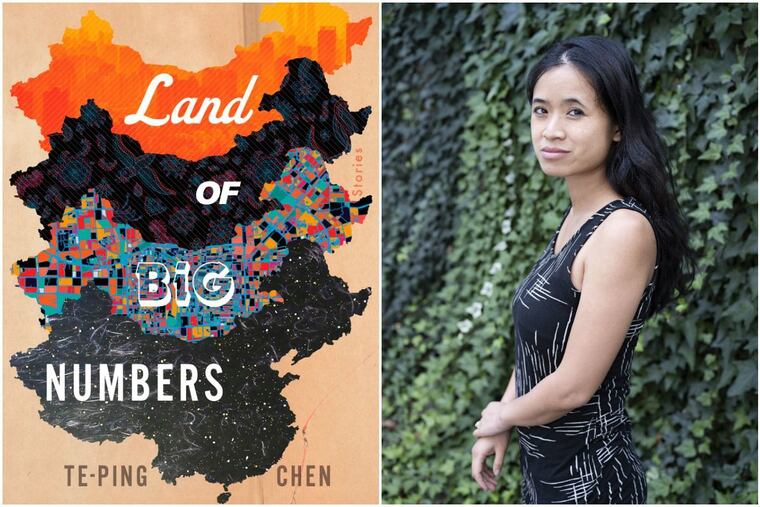Philly writer Te-Ping Chen has one of the year’s big debut books, out now
Chen has worked in China as a Wall Street Journal correspondent. Her stories concern ordinary people trying to live their lives and navigate a government that’s always looming just out of frame.

Philly-area author Te-Ping Chen calls her new collection of short stories set in China a “love letter to the country as well as cultural criticism,” and you can feel that push and pull throughout Land of Big Numbers, out Tuesday from Houghton Mifflin Harcourt.
Its pages are populated by everyday folks living and loving, and trying to navigate the rules and cruelties of a government that’s always looming just out of frame. Chen, who has traveled widely in China as a Wall Street Journal correspondent and now lives near Morris Arborteum (her husband is from the area), employs magical realism with such a light touch it’s often difficult to distinguish the real-world absurdities from her inventions.
In the story “Gobeikou Spirit,” weary commuters become propaganda superstars after getting stranded on a train platform. The scenario has a ring of truth but was conjured from the author’s imagination. The noodle-making robots and funeral strippers in “Flying Machine,” however, are based on Chen’s real-life experiences in China, first as a student and later with the Journal.
Growing up in Oakland, Calif., Chen says she had mythologized the China her grandparents had left behind. She’d heard the stories, seen the photos and artwork, studied the language. In high school she first broached the idea of traveling there, and her father balked. “He was just like, ‘No, you’ll go, you’ll shoot your mouth off, say something stupid and they’ll throw you in jail,’” she recalls. “I was a pretty outspoken teenager.”
That exact scenario, of an idealistic activist running afoul of the government, plays out in Land of Big Numbers’ opening heartbreaker, “Lulu.”
Chen finally made it to Beijing as a college student in 2006 and was disappointed to learn that places she’d heard about from her grandparents were mostly gone. Many of the hutongs (narrow, sometimes centuries-old alleyways lined by shops and houses) were being razed in advance of the 2008 Olympics.
“You would go one day for dumplings at one stall and then the next day you would go back and the entire place was literally just obliterated,” she recalls. “I just remember wandering around through the ruins of so many of these traditional homes. You could still see people’s possessions lying there, and it just felt — it was a profoundly dislocating experience.”
She left dispirited and certain she’d never go back, but eventually she did, on a Fulbright scholarship that led to her Wall Street Journal job reporting on life and trends in Hong Kong, Beijing, and beyond. The position allowed her to escape her earlier “gut emotional reaction” and examine China from other angles, she says.
That’s the China you find in Land of Big Numbers, one full of facets and fractions, a place that cannot be contained by one story, a place where, she says, “over the top” elements are easily “braided” into the real.
Her story “New Fruit,” in which a close-knit neighborhood becomes transfixed by the arrival of a unique piece of produce from the local grocer, is perhaps the collection’s most overt fantasy. At first the fruit evokes romance and pleasant sense memories in the residents, but its second harvest brings only “dark and discordant” feelings, “the emotional equivalent of a stomachache.”
The inspiration for “New Fruit” comes from Chen’s memories of eating nectarines while wandering through those fabled hutongs of old Beijing.
“I had a friend who was always like, you know, they just inject that stuff with sugar water and that’s why they’re so delicious,” she laughs. “I could not tell you if that’s true but I would just eat bags filled with them, and so would everyone else in the neighborhood.”
The story, she says, “embodies so much of the heart of what I love about Beijing. These communities where peddler street vendors bring in fruit and vegetables from the countryside, and people all sit around and gossip and people-watch.”
Underneath, however, there’s a sadness, knowing these people had endured tragedies like the Cultural Revolution and Tiananmen Square. “That was something that was always so striking to me, that you could walk down a path along the sidewalk and know that they’d seen that history and were carrying it around with them at any time.”
Chen now reports for the Journal on employment and work culture in the COVID-19 era. She says she’s glad she left China before it started kicking out western journalists last year.
The country, she observes, is always in flux. Some people protest in the name of change, some try to adapt and survive. “They’re living in a society when so many things are out of their control, which is something many of us are feeling right now.”
Virtual author talk
Te-Ping Chen and Shruti Swamy
Te-Ping Chen and fellow short-story author Shruti Swamy will read from their work at 7 p.m. Thursday at a Blue Stoop event hosted by Alexandra Chang. It can be streamed at bluestoop.org.